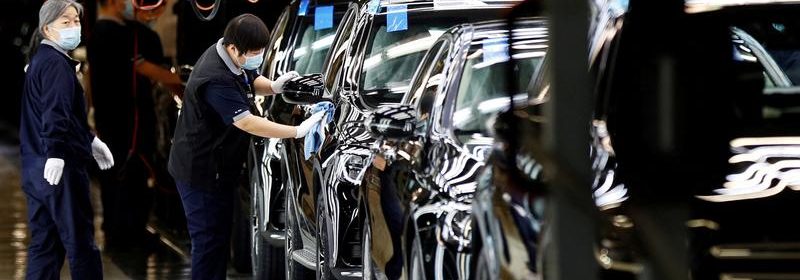China's factory activity falls at slower pace as COVID curbs ease

BEIJING (Reuters) – China’s factory activity contracted at a slower pace in May as COVID-19 curbs in major manufacturing hubs were relaxed, but movement controls still depressed domestic demand, restrained production and weighed on the economy in the second quarter.
The official manufacturing Purchasing Managers’ Index (PMI) rose to 49.6 in May from 47.4 in April, the National Bureau of Statistics (NBS) said on Tuesday, marking the highest in three months but also the third consecutive contraction.
A Reuters poll expected the PMI to come in at 48.6, below the 50-point mark that separates contraction from growth on a monthly basis.
Though restrictions implemented in the major manufacturing hubs of Shanghai and in the northeast eased in May, analysts said the resumption in output was slow, restrained by sluggish domestic consumption and softening global demand.
Finished goods inventories at the national level in April shot up to their highest since at least 2010, but recent lockdowns are likely to prove disinflationary domestically, Julian Evans-Pritchard, economist at Capital Economics, said in a note on Friday.
He added that the glut of supply in China was also likely to weigh on export prices.
“After two years in which all of the pricing power was on the side of Chinese producers, the tables have turned,” he said.
That would add more pressure on exports which lost momentum this year, casting a shadow on the economic rebound.
Many analysts expect the economy to shrink in the April-June quarter from a year earlier, compared with the first quarter’s 4.8% growth.
China’s economy was ravaged by strict restrictions in April as the country grappled with the worst COVID-19 outbreak since 2020, with economic difficulties in some aspects now worse than two years ago.
Profits at China’s industrial firms fell at their fastest pace in two years last month as high raw material prices and supply chain chaos eroded margins.
In line with the weakness in the factory sector, services remained soft. The official non-manufacturing PMI in May improved to 47.8 from 41.9 in April.
As consumers were confined to homes, retail sales in April shrank 11.1% from a year earlier, the biggest contraction since March 2020 due to further deterioration in COVID-sensitive catering services and slumping auto sales.
China’s official composite PMI, which includes both manufacturing and services activity, stood at 48.4, compared with 42.7 in April.
With greater urgency to support the pandemic-hit economy, Premier Li Keqiang last week reiterated frontloading of policy support and said China would seek positive year-on-year economic growth in the second quarter.
Beijing has vowed to broaden tax rebates, postpone social security payments and loan repayments and roll out new investment projects to support the economy, though analysts say the government has shown no sign of relaxing its zero-COVID policy.
Source: Read Full Article
